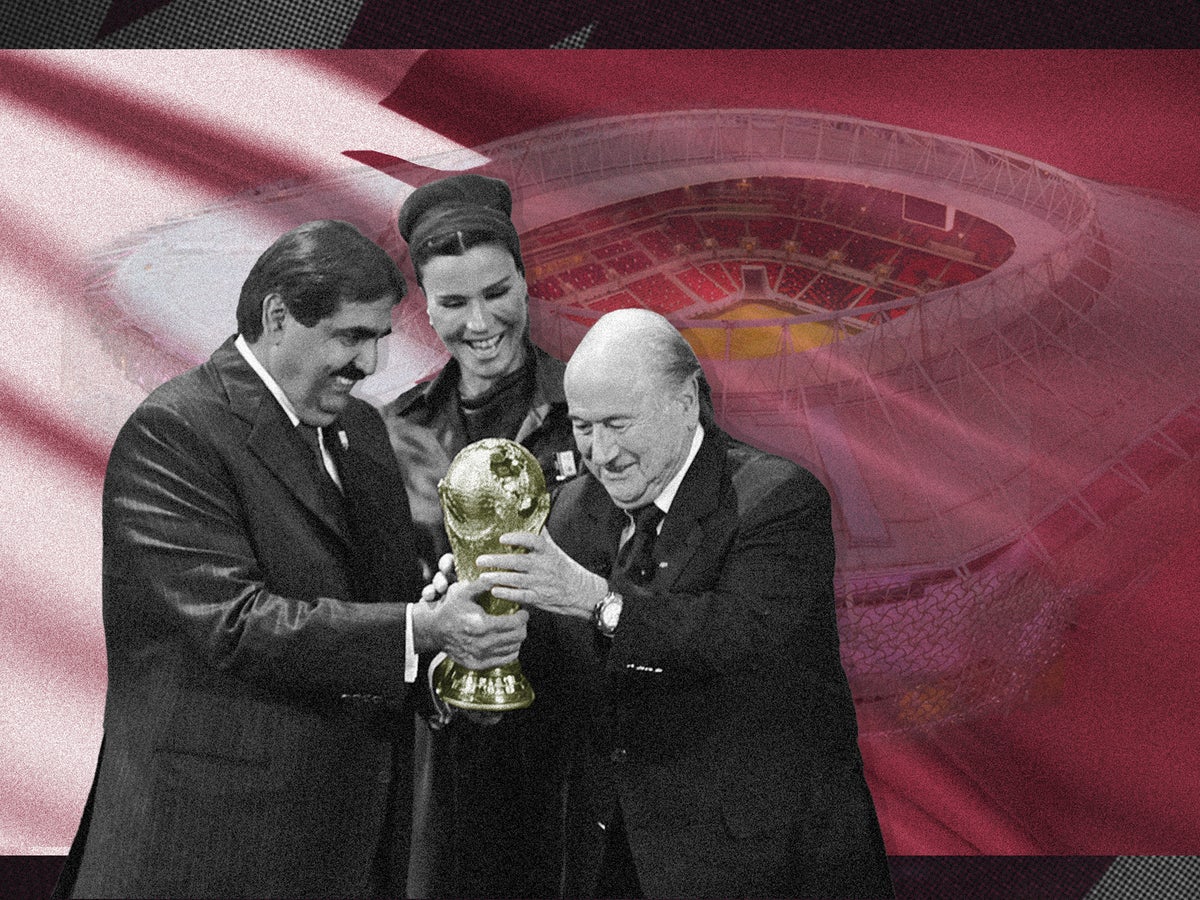
Out of the many facts and figures circulated about Qatar’s problems, there is one realisation that should stand above everything. It is a disgrace that, in 2022, a country can host a World Cup where it has lured millions of people from the poorest countries on earth - often under false pretences - and then forced them into what many call “modern slavery”.
And yet this has just been accepted. The World Cup carries on, an end product of a structure that is at once Orwellian and Kafkaesque. A huge underclass of people work in an autocratic surveillance state, amid an interconnected network of issues that make it almost impossible to escape. “It’s all so embedded,” says Michael Page of Human Rights Watch.
Many will point to similar problems in the west but this isn’t the failure of a system. It is the system, global inequality taken to an extreme. “The bottom line is that these human rights abuses are not normal for a World Cup host,” says Minky Worden, also of Human Rights Watch.
Qatar 2022 has so many concerns it has a strong claim to be the most problematic football competition ever, maybe surpassing Argentina 1978. It is so bad that, when human rights groups went to federations with various individual points, they were told to come up with common causes.
That led to the call for Fifa to match prize money with compensation for migrant workers, but there hasn’t yet been movement on that. One simple appeal to humanity hasn’t yet moved the game. That makes it all the more relevant to actually spell out everything the world is walking into. You can jump to any of the following sections, below:
When Qatar shocked the planet by winning the World Cup bid in December 2010, it was “probably the Gulf state about which the least was known”, according to FairSquare’s Nick McGeehan. That has drastically changed.
Qatar went for the competition to drive an economic diversification programme for a world after fossil fuels, and key to that is presenting the country as a business centre without complicated questions on human rights. It is the most elementary example of “sportswashing”.
“It was done in 1936,” Page says, “but it’s now supercharged.” It’s also far more sophisticated than simple image improvement. It is really about buying off or integrating into western infrastructure so moral scrutiny becomes impossible. Qatar has similarly invested billions into EU countries, completely subduing the usual political criticism. It is how this World Cup can somehow be held without significant reform.
“As we’ve seen with Saudi Arabia, nations with deep pockets and poor human rights records are undoubtedly aware of how sport has the potential to reshape their international reputation,” says Sacha Deshmukh, Amnesty International’s UK chief executive. “This is the modern playbook. The calculation appears to be that a new investment in sport may bring some temporary criticism, but that this will be outweighed in the longer term by the substantial rebranding benefits.”
In that sense, this World Cup will ensure Qatar is associated with modern equivalents of, say, Gordon Banks’s save against Brazil. It is a powerful thing. As one source argues, “it’s a lot harder to invade somewhere if they’ve just hosted a World Cup”.
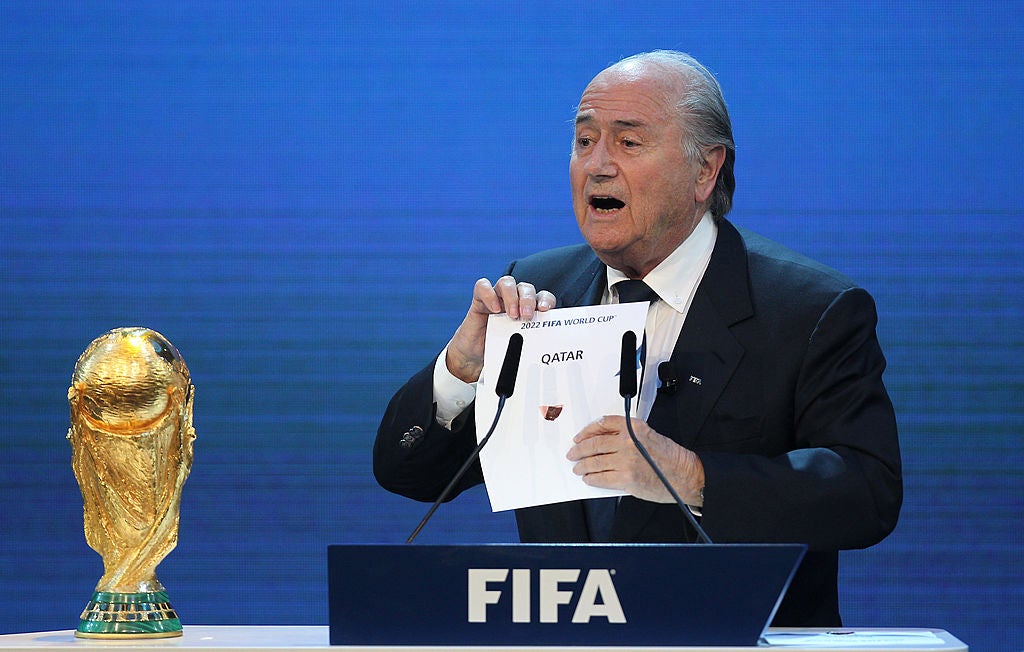
This is where reference to Saudi Arabia is so pointed. The bid for the World Cup came amid an escalating regional rivalry that led to the 2017 Gulf blockade, Qatar on one side, United Arab Emirates and Saudi Arabia on the other. And what is happening on Sunday? It was supposed to just be the Abu Dhabi Grand Prix. Instead, the World Cup’s opening game has been moved, overshadowing everything and underlining what sport has been reduced to.
The manner the bid was won
The reasons that Qatar shocked the world in 2010 was because they didn’t seem to have support or even infrastructure, given Fifa’s own report described their bid as “high risk”. They did have a lot of money, though. Whistleblower Phaeda Almajid has since claimed she was in the rooms as members of Fifa’s executive committee were offered bribes of $1.5m. It has similarly been reported by the Sunday Times that Mohamed bin Hammam, the driver of Qatar’s bid, had used secret slush funds to make payments to senior officials totalling £3.8m. Bin Hammam was banned for life from all Fifa related activities by the ethics committee, although this was later overturned due to lack of evidence, but then reinstated over conflicts of interest.
In April 2020, the United States Department of Justice alleged that three exco members received payments to support Qatar. The FBI’s William F Sweeney Jnr stated how “the defendants and their co-conspirators corrupted the governance and business of international soccer with bribes and kickbacks, and engaged in criminal fraudulent schemes”.
The Supreme Committee has long denied the claims.
If there’s one issue that has most dominated coverage of Qatar, and especially angered the state, it is the report of 6,500 migrant worker deaths first set by The Guardian. That anger, to be blunt, is itself an outrage.
The only reason Qatar can possibly dispute the figures is because of the circular tragic farce that the state simply won’t investigate deaths. “This is the scandal of it,” McGeehan says. “It’s the wrong argument. It’s about the proven negligence and the rate of unexplained deaths."
That, according to a 2021 Amnesty International report, stands at approximately 70 per cent. What can be said with absolute certainty is that the actual number would be shocking, although even the three deaths officially recorded - Zac Cox, Anil Human Pasman and Tej Narayan Tharu - is obviously tragically bad enough. It goes without saying that a sporting competition should not involve a single death or any human suffering.
And yet Qatar has involved numbers that, statistically, are likely to be magnitudes higher. Hundreds of thousands of workers have been for years forced to work in searing summer months, which FairSquare describes as a “demonstrable risk” to workers’ lives due to “clear evidence linking heat to worker deaths”, especially when allied to strenuous work.
A report Qatar itself commissioned found workers are “potentially performing their job under significant occupational heat stress” for a third of the year. One in three workers were found to have become hyperthermic at some point.
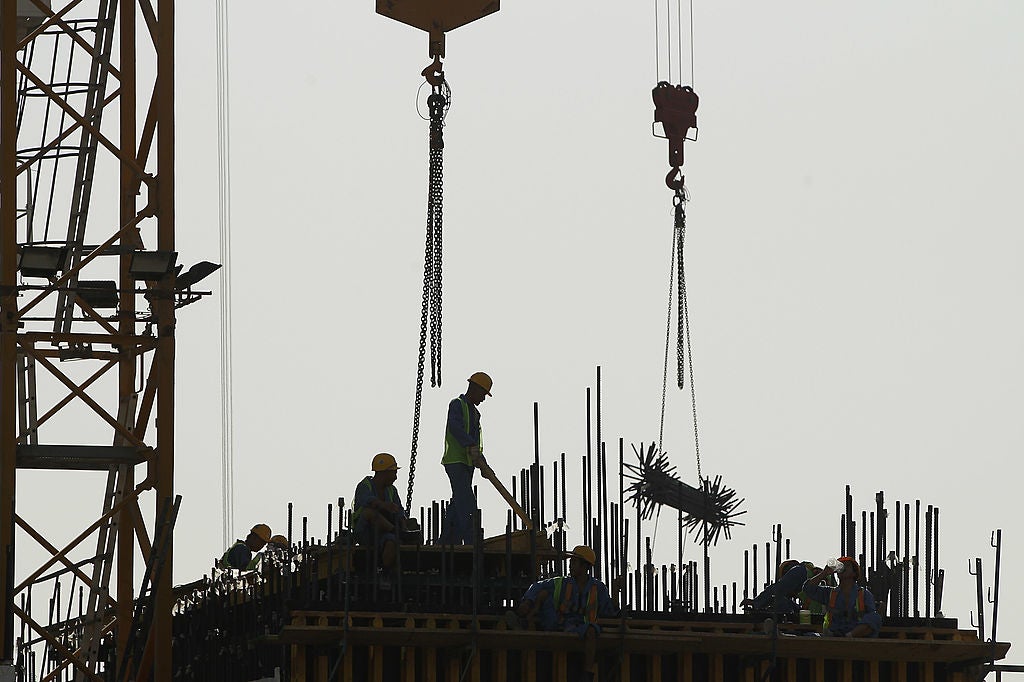
The country’s list of “occupational diseases” does not include deaths resulting from heat stress.
Instead, Amnesty’s study claims that approximately 70 per cent of migrant worker deaths are reported with terms such as “natural causes” or “cardiac arrest”.
“These are phrases that should not be included on a death certificate,” pathologist Dr David Bailey told Amnesty. Those phrases also mean they do not get recorded as deaths linked to the World Cup, and neither do those outside the “footprint” of the stadium. Additionally, Qatar has historically prohibited post-mortems, unless to determine a criminal act or pre-existing illness. “They have not investigated circumstances where a worker dies in their bed,” Page adds.
A recent Daily Mail investigation claims that, between 2011 and 2020, 2,823 foreigners of working age died of “unclassified” reasons. The International Labour Organisation [ILO] have meanwhile noted there is likely under-reporting, because companies want to avoid reputation damage or paying compensation, which starts to cut to the core of the problem.
“They haven’t been pushed on it enough,” Page says “I think there are two factors around the lack of meaningful independent investigation. One, it wouldn’t make them look good. Two, being on the hook for compensation. We’ve tried to be cautious at HRW, we’ve said thousands, but we don’t know precisely because of the Qatari authorities. It’s all the more frustrating because their health infrastructure has the capacity to measure this.
“But they don’t want to make data knowable that highlights what the severity of the problem is.”
One of the sad ironies of this tournament is that it is supposed to be Qatar welcoming the world, in the global party the competition has become, but a lot of the world just doesn’t feel welcome.
“We’re not travelling to this World Cup,” says Di Cunningham of Three Lions Pride. “That’s in spite of the fact we travelled to Russia. There is a toxic environment for LGBTQ and other minority groups.”
Article 296 of Qatar’s penal code specifies that same-sex relations between men is an offence, with a punishment of up to three years in prison. The death penalty is possible under sharia law, but there are no known records of it being enforced for homosexuality. Qatar has continued to insist everyday reality is different and everyone is welcome so long as they respect the culture, but this just isn’t sufficient for LGBTQ groups.
“We’re hearing what seems to be this kind of robotic insistence that all will be well, that we’ll be safe, that we’ll be welcome,” Cunningham says. “But there’s been no documented plans, no unified messaging, no apparent collective will. It’s actually been the opposition. We’ve seen unchallenged public demonising of LGBTQ people from prominent members of the establishment.”
The week before the World Cup saw the latest in a series of alarming statements, with former Qatari international Khalid Salman describing homosexuality as “damage in the mind”. It feeds into a culture that has seen Human Rights Watch report that the Qatar Preventive Security Department forces have arbitrarily arrested LGBTQ people and subjected them to ill-treatment, with six cases of severe and repeated beatings and five cases of sexual harassment in police custody between 2019 and 2022. Transgender women had their phones illegally searched, and then had to attend conversion therapy sessions as a requirement of their release.
These acts could constitute arbitrary detention under international human rights law. One transgender woman reported that an officer hit and kicked here while stating “you gays are immoral, so we will be the same to you”.
Another described the Preventive Security as “a mafia” who beat her every day and shaved her hair, while making her take off her shirt to take pictures of her breasts.
“It’s a situation where people of diverse sexual orientations and gender identities are unfortunately unable to live their lives openly,” says Chamindraw Weerawardhana of ILGA World (the International Lesbian, Gay, Bisexual, Trans and Intersex Association). “Fear of the establishment prevails. These basic rights we’re talking about are fully compatible with Islamic principles of human rights.”
Thomas Beattie, a former professional footballer who came out in 2020, echoes such sentiments. “Awarding the privilege of hosting a global foreign event to nations which embody this mindset is really damaging to my community, especially because you kind of send this message that we’re a secondary thought and we don’t really matter,” he says. “I don’t think I would feel any safer.”
Recruitment fees and lies
One of many poignant scenes in a documentary called The Workers Cup is when Kenneth, from Ghana, talks of when he was first lured to Qatar. A recruitment agent made the 21-year-old think he would be transferred from a construction job to a professional football club. That didn’t happen.
It should be acknowledged that most workers come of their own accord, since a meagre salary in Doha can be transformative in Nepal or Bangladesh. That’s also where the exploitation starts.
There’s a haunting line from another migrant in the documentary, Padam from Nepal.
“When I discovered the reality it was too late.”
That reality, according to Isobel Archer of the Business and Human Rights Resource Centre (BHRRC), involves illegal recruitment fees amounting to “hundreds, or even thousands of dollars and is one of the worst drivers of abuse in the region”. It has been estimated that Bangladeshi men have paid £1.14bn in fees between 2011 and 2020.
Since most workers can’t afford this, and need to arrange loans or wage levies, it instantly puts them in debt and, essentially, a financial trap. Their general salary is between $220-350 a month, meaning they can never make enough to free the debt and “leaving them vulnerable to a range of exploitative practices,” according to Michael Posner, director of the NYU Stern Center for Business and Human Rights.
“Since 2016, we have recorded 89 cases of migrant workers paying recruitment fees in Qatar,” Archer adds. “Undoubtedly there are workers looking after football fans and teams this month who toil under the burden of debt.”
Although Qatari authorities have stated the practice of recruitment fees is outside their jurisdiction, Human Rights Watch has said they have failed to address the role Qatar-based businesses play in passing on costs to recruiters they know will be borne by workers, and that there is insufficient oversight.
This is the gateway to so much abuse.
In a recent Amnesty report on security workers, many interviewers said they couldn’t remember their last day off, with over 85 per cent saying those days were usually up to 12 hours long. Yet, when one interviewee claimed he tried to take a sick day, he was told he would be docked wages and felt in fear of deportation.
“You are like a programmed computer; you just get used to it. You feel it is normal, but it’s not really normal.
“Denying employees their right to rest through the threat of financial penalty, or compelling them to work when ill, can amount to forced labour under the ILO Convention on Forced Labour. This is one of many descriptions around Qatar that just shouldn’t be used in 2022, let alone for a football tournament.
Professor Tendayi Achiume, the UN’s Special Rapporteur on Contemporary Forms of Racism, described “indentured or coercive labour conditions” that recall “the historical reliance on enslaved and coerced labour in the region”.
The workers themselves are more blunt. One in The Workers Cup says they “are staying in Qatar against their will”. “Modern slavery”, another interjects. The BHRRC use the exact same phrase.
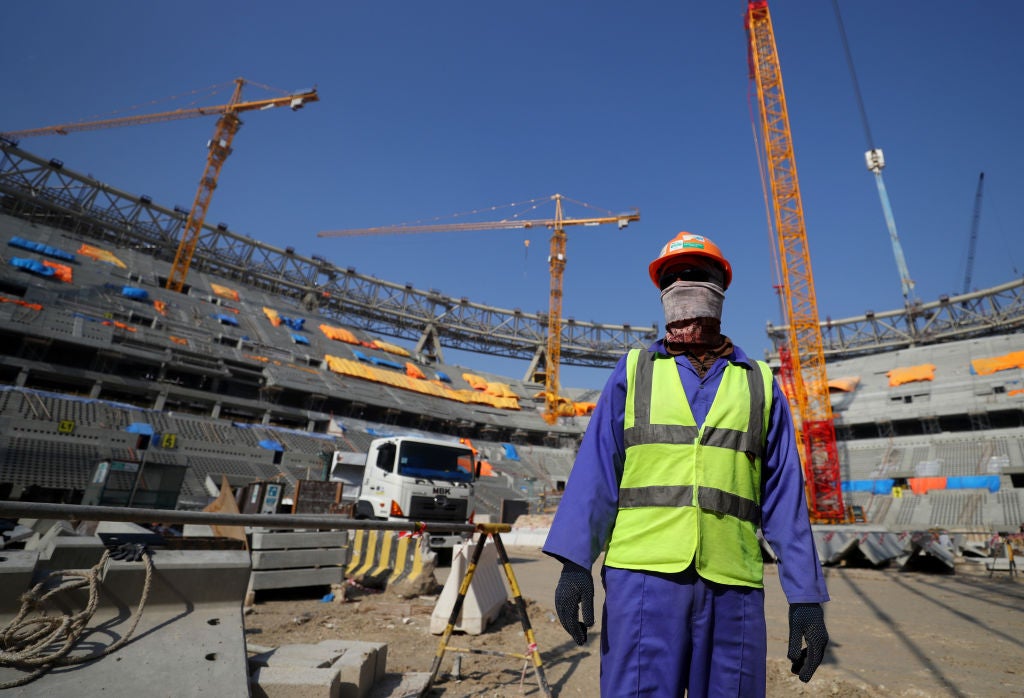
There are around two million people in this situation right now, comprising 95 per cent of the Qatari workforce, and mostly coming from East Africa, South and Southeast Asia.
They will be visible all over for the next month, their chain-gang lives now well-rehearsed. The workers arrive in exorbitant debt and have to hand over their passports, despite laws prohibiting this. All of that ensures companies have total control of their lives, as they travel to what Deshmukh describes as “squalid, overcrowded accommodation with no air-conditioning and exposed to overflowing sewage or uncovered septic tanks”. The workers aren’t allowed leave without permission, which is rare.
To only add to the everyday misery, there are huge fines for mistakes, forced work in searing heat without shelter and many not receiving overtime or not getting paid altogether.
It is then almost impossible to change jobs.
“In 2013, we published a 166-page report on the rampant exploitation of Qatar’s massive migrant labour force,” Deshmukh says. “We said that employers in Qatar had an “appalling disregard for the basic human rights of migrant workers”.
“This is the human cost of Qatar 2022,” Archer adds.
Kafala and its enabling culture
You don’t have to be in Doha long to see a local or an “ex-pat” speak to migrant workers in a manner most people would find abhorrent. It is not universal but it is unmistakable, and starts to point to the deeper culture that has kept this structure in place. Sources who live there commonly speak of workers getting threatened with being reported if they don’t show the expected attitude. You can sense a timid trepidation.
“The culture and structure of the Qatar state effectively enables the abuse of migrant workers, regardless of legal challenges,” Deshmukh says. “Workers cannot organise to protect their own rights by forming or joining trade unions. They still risk being arrested or deported if their employers cancel their visas, refuse to renew their residence permit or report them as having ‘absconded’. They are living and working in a country where dissent in any form is not tolerated.”
Much of this stems from the notorious Kafala system, now abolished in law, but still resistant in practice. Another tragic irony is that the original Islamic tradition was supposed to be about a religious responsibility to protect the vulnerable, but evolved under British colonial rule to the opposite. It became a cost-effective way to control labour and organise the empire. A super-rich caste of society was then bolted onto this with the discovery of oil.
The wider effect on workers
In one shocking moment during The Workers Cup, a co-worker is attacked by a roommate in the middle of the night, his leg cut with a blade. The worker did it to escape, as he knew it would likely see him deported.
The most remarkable aspect of this, however, is that all of them - even the man attacked - are calm because they could understand the mindset. He just wanted out. It isn’t just the workers’ physical health being ruined. It is also their mental health.
“Wage theft”, which is how NGOs describe missed payments, are especially ruinous. Workers are usually the sole source of income for their families and, if they cannot send it on, education fees and meals are missed.
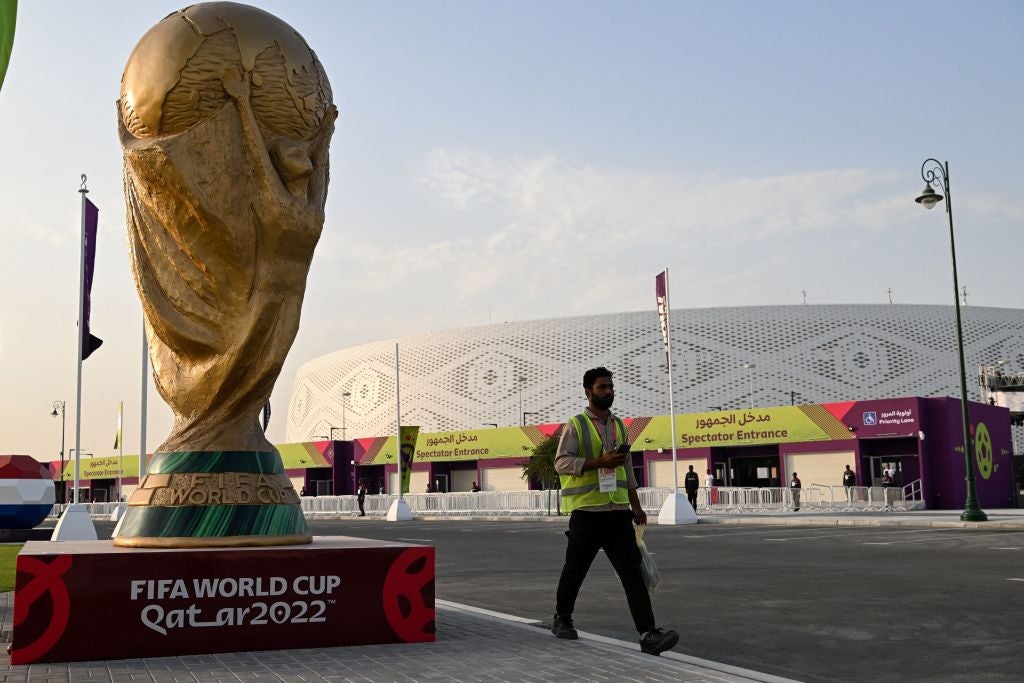
Many can’t cope with the pressure. Inside Qatar, by John McManus, reports that 36 per cent of patients to Qatar’s primary psychiatry unit were migrant workers and 15 per cent were suicidal.
“With all this struggling, what’s the good of our lives anyway,” Paul in The Workers Cup says.
The pressure to provide for family is made worse since they are so far away from them. Workers cramped together still feel overwhelming loneliness. There’s then the effect on the families themselves, particularly those who have had loved ones die in “unexplained circumstances”. With no compensation, they are only left with questions and grief.
Allegations of a racist labour system
Over the last few years, much has been made of players taking the knee, rightfully protesting racial abuse. They couldn’t have a clearer example than the World Cup hosts. Professor Achiume’s report described how western and Arab nationalities “systematically enjoy greater human rights protections than South Asian and sub-Saharan African nationalities”, a situation that “raises serious concerns of structural racial discrimination against non-nationals in Qatar” and creates “a quasi-caste system based on national origin”.
Pay discrimination on the basis of nationality, race and language is reported by more than a third of interviewees in one Amnesty report.
“You may find a Kenyan is earning 1,300 [riyals], but the same security from the Philippines gets 1,500. Tunisians, 1,700,” one security guard says. Pay is according to nationality.”
It goes even deeper. The security guards are always black Africans. Women from the Philippines are preferred as maids. Nepalis, Bangladeshis and Indians form the majority of the workforce in hazardous jobs.
Academics such as John Chalcraft talk of how this is not just intentional, but another insidious form of control. Migrant workers used to come from other Middle Eastern countries, such as Egypt, only for the Gulf elites to find that made it easier for them to band together and discuss problems. Splitting groups by nationalities prevents this.
Greater discrimination within jobs
There are around 175,000 domestic workers in Qatar, with 60 per cent of them women, and Amnesty’s May Romanos describes them as “the most vulnerable group” in the country. “Laws are weak or not very well enforced, or not enforced at all.”
This, according to one legislation expert who spoke to Inside Qatar, is because it’s about the privacy of people’s homes. Many domestic workers are brought in on visas for different jobs and consequently don’t have employment contracts. They are commonly referred to as “the maid”. That erosion of identity is all the more lamentable since they represent the worst cases of abuse. Joanna Demafelis’ body was found in her employer’s freezer over a year after she was reported missing. Tuti Tusilawati was executed for killing her Saudi employer when he tried to sexually assault her.
“They are often isolated in their employer’s house, and tend to be really forgotten,” Romanos says.“Our research continues to show that the domestic workers typically work over 16 hours a day with little to no rest.
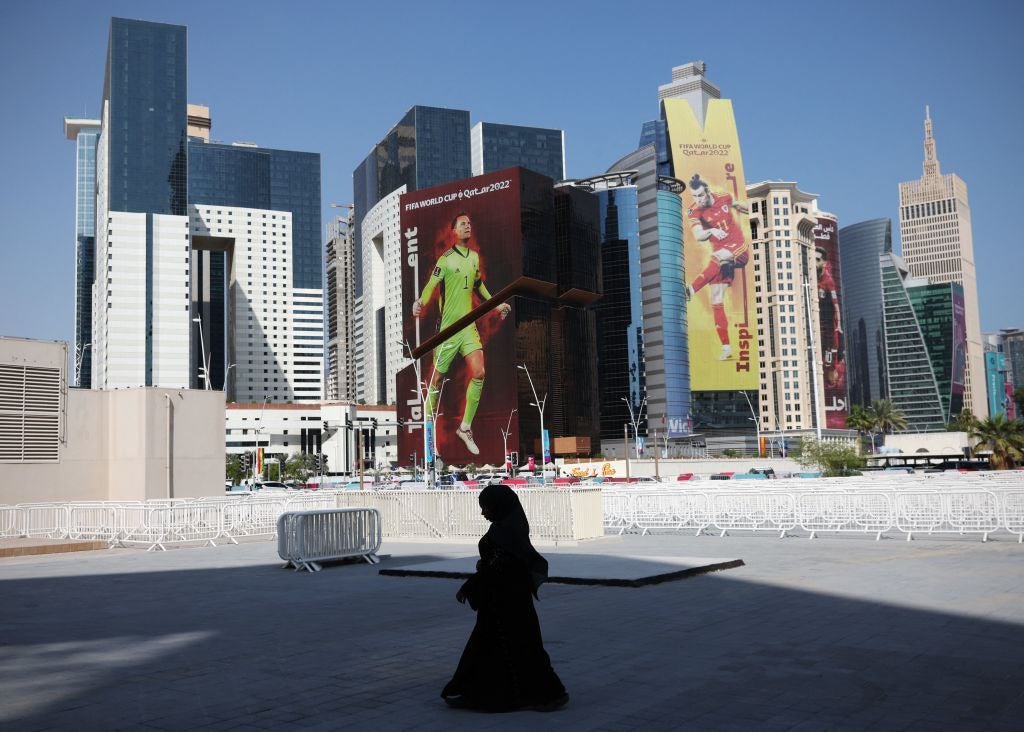
“We found that they were victim of verbal, physical and sexual abuses. Out of the 105 women we interviewed, 30 said they were victims of verbal abuse, 15 was said they were victims of physical abuse, and five sexually abused.
“Ultimately none of these women saw the perpetrators held to account.
“The minute they accused their employer of rape or sexual or physical abuse, they are at risk of detention and deportation. They have no confidence in the system.”
Problems run far deeper than the World Cup
As some of the above accounts make clear, the systematic problems run far deeper than the World Cup. They’re everywhere you turn: the roads, hotels, transport, catering.
“You can’t get away from it,” Page says. “People use this phrase ‘stained in blood’, but it’s definitely stained in serious abuses. There’s a direct line.
“A lot of this was because they had this huge infrastructure deficit they had to make up.” Deshmukh warns how this has started to influence reform, too.
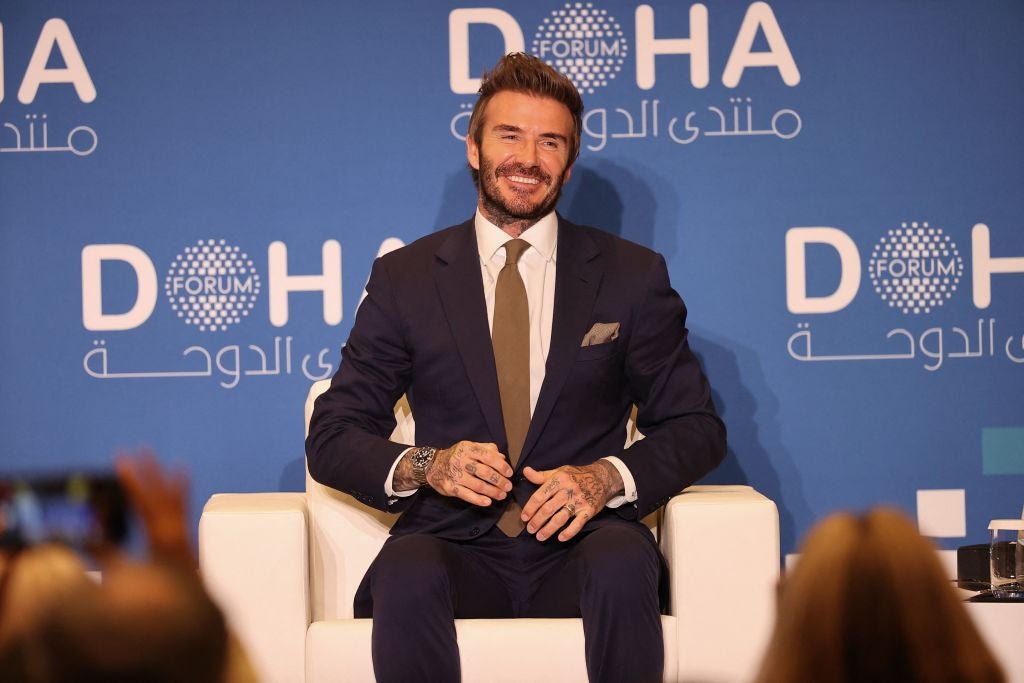
“Qatar shouldn’t be one rule for the World Cup workers and another for everyone else. Unfortunately, we’re seeing some of this two-tier thinking in terms of how Qatar has responded to recalls for reforms and remediation for past abuses. Qatar’s Supreme Committee has introduced some enhanced labour standards on official tournament sites such as stadia, but this amounts to only two per cent of Qatar’s workforce.”
David Beckham’s face is all over Doha right now, on billboards that look like they’re really maximising that reported £150m deal. The England star isn’t doing many promotion interviews, though, and it’s hard not to think an obvious question would be whether he feels such money should also go to migrant workers.
That points to one of the most obnoxiously offensive elements of this World Cup. Qatar has more than enough money to equitably reform their labour system, and has had 12 years to start restructuring. The state has instead decided to spend fortunes on public relations, pushing back against criticisms rather than addressing them. This is as base sportswashing as you can get.
How reforms mean so little in practice
One of the most common lines over the last few months, always so dutifully repeated by football people, is that “we must recognise the changes Qatar has made”.
In law and in headlines, maybe. In practice? That depends on which human rights group you ask, with some saying it’s “negligible” and others “limited” but all agree any reform has “not been properly enforced”.
This is most evident with Kafala. It was legally abolished in 2017 but so many of the practices and abuses remain.
“In 2021, hotel workers reported they were not able to freely change jobs despite the much-lauded reform abolishing the Kafala system,” Archer says. “The introduction of these labour reforms without meaningful and systematic implementation was simply not enough – paper reform cannot be used as an excuse for no further action.”
So much again comes back to the cultural infrastructure. Archer describes “unscrupulous employers who know how to game the system or that they will face minimal accountability”.
McGeehan points to obstacles like profit margins, debt as a mechanism of control and basic power. Companies have targets to meet, and that isn’t aided by more rigorous requirements that aren’t actually properly policed.
“Employers often have political connections, they’re part of an elite,” Page explains. “There’s a lot of private interest that is very much below the surface of state interest when you’re building this much infrastructure this quickly. Qatar is not unique in that but when you have this weak a system, as well as those elite private interests, it’s really hard to institute reforms.
“It comes back to the question of why they’re paying people like David Beckham when you could just address this. I think there are some real tension points between wanting to admit problems and, two, that trying to fix these things goes against various private interests.”
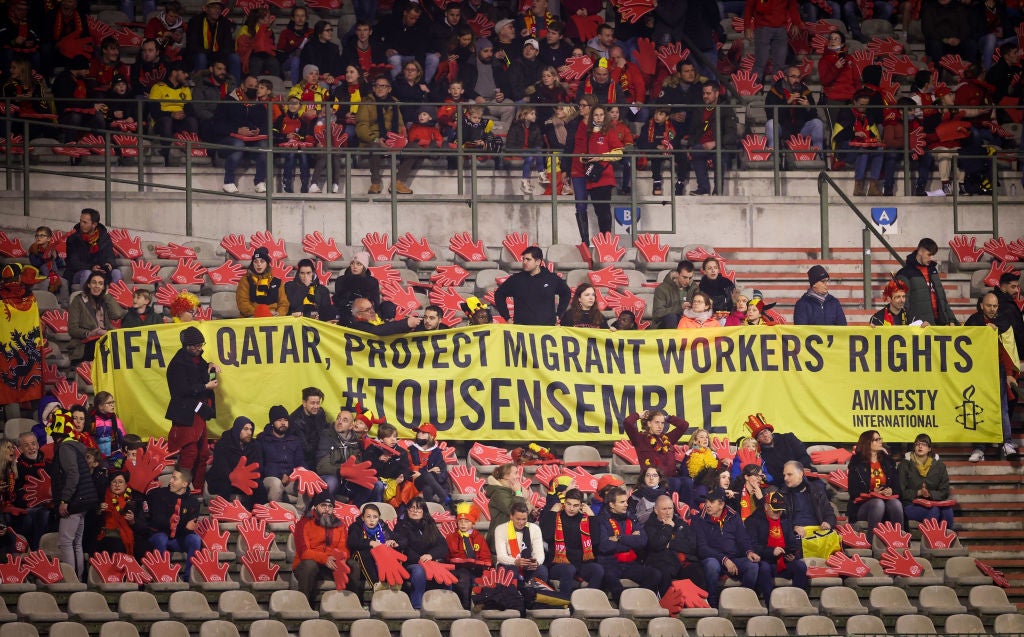
There has even been pushback on the idea of Fifa compensation because of this.
As an example of how the reforms fail, Page points to the abolition of non-objection certificates, which theoretically frees workers to move easily between companies. The government said that 240,000 changes were approved in the new year, but human rights groups have found since then that employers are inventing all manner of obstacles. Among them are additional written approval, and even “release fees”.
So, rather than leading to more workers changing jobs, it actually led to more false charges of “absconding”.
“It’s the classic example of great on paper, different in reality,” Page says. “And then add the informal issues, such as unpaid wages, theft issues, concerns that if you go home you won’t get that money again. It’s still a crime to abscond. Employers can report you.”
There’s also the inability of workers to unionise, as well as a myriad network of contractors and companies that makes it difficult for a weak system to audit performance and fosters a total lack of transparency.
This comes amid a wider context of considerable debate within Qatar about how far reforms should go. Division has even been visible in public presentations, as a conservative core remains resistant.
“Ultimately, as long as unscrupulous employers know they can operate with impunity, they will do,” Archer says.
Women’s rights
In some of the security briefings before Qatar, a few female journalists have been advised to wear conservative clothing despite heat currently hitting 35 degrees. It wasn’t a message passed to male journalists. That reflects a much more restrictive environment for women. Many Qataris adhere to ultra-conservative Wahhabism, with the culture shaped by patriarchal views. Women require the approval of a male guardian for core aspects of life, from studying abroad to a driver’s licence.
NGOs argue that Qatar’s laws related to sexual intercourse are biased against women, warning they can face prosecution if they report assault. Abortion is illegal in most circumstances.
“This discrimination also denies women the authority to act as their child’s primary guardian,” says Rothna Begum of Human Rights Watch.
“These kinds of rules essentially reinforce the power and control that men have over women’s lives and choices, and actually further violence against them. There are no women’s rights organisations in the country.”
“The underlying climate for women and girls is deeply problematic,” Worden adds.
In a Foreign Office briefing last week, travelling supporters were warned they wouldn’t get away with any crimes because Qatar has more CCTV than almost anywhere in the world. “Every corner is filmed.” This is one of many reasons migrant workers are so afraid to complain or trust interviewers. It is only the base of an extensive surveillance state, that serves an autocratic monarchy where political parties are banned and its constitution gives near-absolute powers to the emir.
For all the state’s insistence it is open, freedom of expression and assembly are greatly limited.
“It’s a society where nobody can speak their mind,” one high-level figure who has worked in the country says. “There’s a high risk someone is listening to what you’re saying - especially on the phone.”
Oyvind Vasaasen, head of security at Norway’s NRK, recently raised spyware concerns over the Hayya app travelling supporters will have to download. “They can have full control over the information that is there,” he said.
The Foreign Office were unable to offer any proper assurances when this was raised. Qatar meanwhile ranks 128 out of 180 in the World Press Freedom Index, behind Uganda and Afghanistan. Most media is state-owned or affiliated. The law governing media gives right to “delete any paragraph, article, research or comment” that references banned subjects.
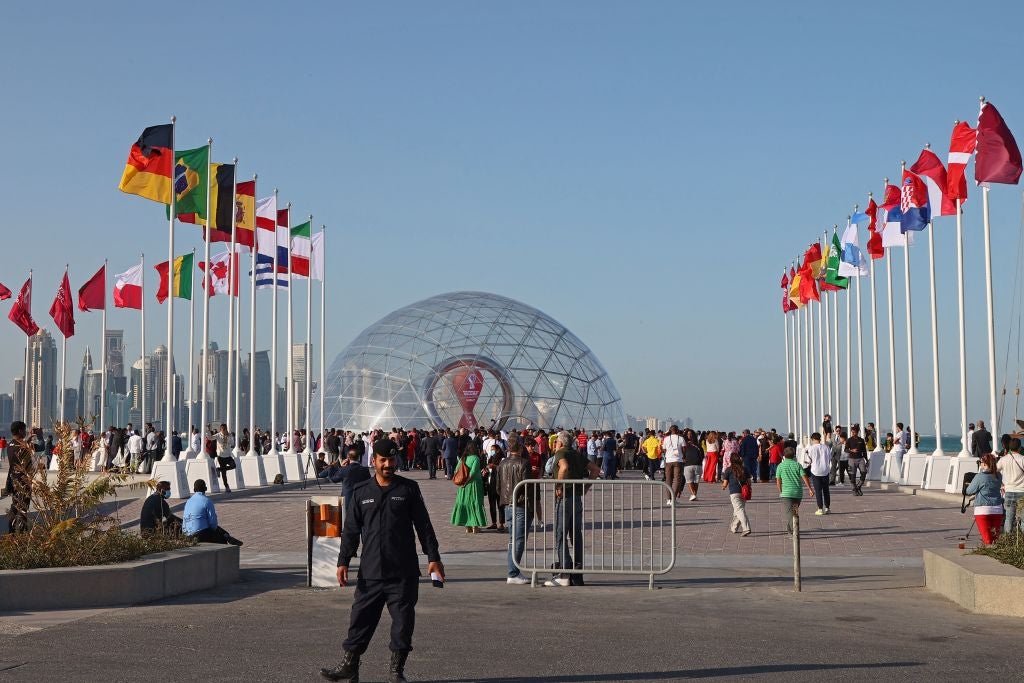
The full consequences can be seen with a series of dissidents. Abdullah Ibhais is a Supreme Committee whistleblower who is serving a three-year prison sentence after what Amnesty describes as an unfair trial and a so-called confession he claims was obtained coercively. His family on Monday released a statement revealing a “surprise hearing” where neither Ibhais nor his lawyer were present, saying this proves “their only concern is to silence” him. Abdullah Al-Malki is meanwhile a dissident exile who has been staging peaceful protests, sometimes in front of Qatar’s European embassies. He is facing a politically motivated trial, with some calls for the death penalty.
Romanos talks of how dissident cases often have a similar pattern, which is “serious concerns of unfair trials, forced confessions, solitary confinement and no access to a lawyer”.
“There is no civil society, no human rights organisations and it’s difficult really to have a place where you could report and work on human rights abuses,” she adds. “Freedom of expression is restricted.”
It is one reason political protests could be such a key part of this World Cup. Many groups are expected to use the global spotlight to finally express concerns, and of great importance will be how they are policed.
The environmental cost
There is an incredible sentence in one World Cup guide, where it is advised to bring a scarf and hat to games due to the air-conditioning. The needless carbon footprint of this is almost too troubling to consider. Then again, this is a tournament where a £220bn infrastructure has been built for a competition only lasting four weeks. It is the very definition of unsustainable. That it happens in an economy built on fossil fuels, where ‘Inside Qatar’ talks of pushback against renewables, only adds to the tragic farce.
Greenly, the France-based company that measures carbon footprint, has estimated a minimum of six million tonnes of CO2 equivalent emissions over the course of this tournament. That is almost double Fifa’s claimed estimate of 3.6m tonnes, and demolishes claims that this will be the first carbon-neutral World Cup. While Qatar has meanwhile committed to purchasing carbon credits to offset emissions, only three projects were approved in the final weeks before the tournament. They represent less than 5 per cent of total emissions. Greenly’s Alexis Normand describes it as “irrational” from an ecological point of view.
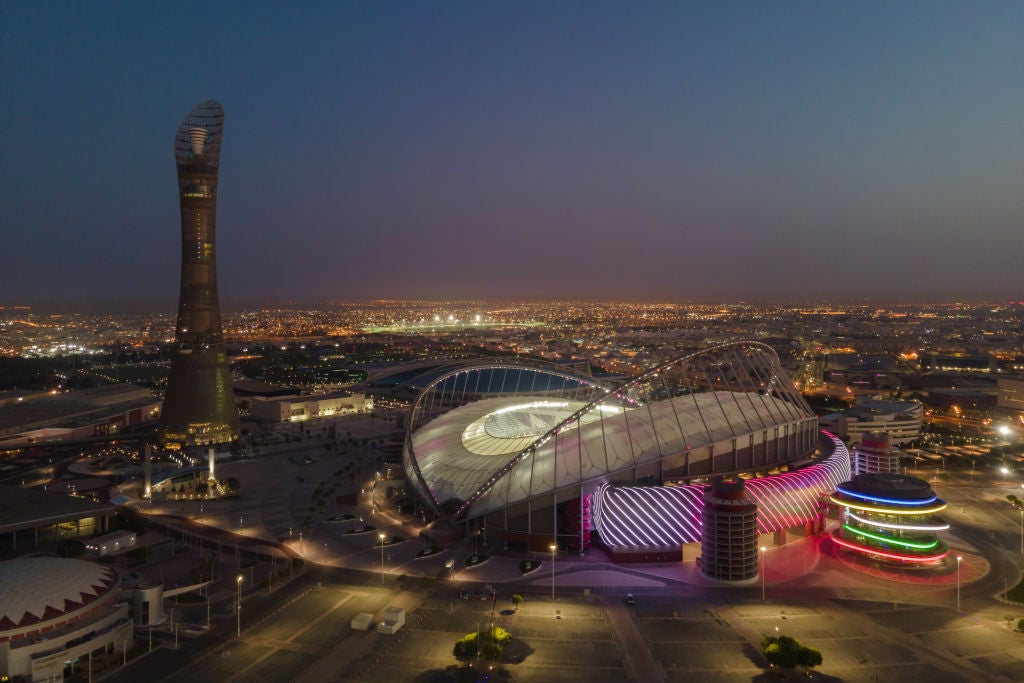
The lost opportunity for reform
In the days before the World Cup, migrant workers were visible in Doha, still toiling to finish preparations, many suffering the same ongoing problems highlighted in this article.
“The evidence is the king,” Equidem’s Mustafa Qadri says. “Workers are still facing all the things they claim the labour reforms removed. Companies are actually attempting to hide problems.”
Far from acknowledging these issues in the manner that had at least characterised the last few years, however, Qatar’s attitude has become increasingly belligerent in the last few months.
“The level of defensiveness has not been a good sign in terms of what happens post-World Cup,” Page says. The problem is all the documentation we’re doing now - the wage abuses, recruitment fees, LGBTQ treatment - this is not prior research we’ve done for years. It’s now. It’s concerning we’re continuing to find the same problems. Now, the response is ‘we don’t want to hear it any more, no compensation fund, don’t talk about LGBTQ people’. It doesn’t bode well for the future.”
A dreadful example, a concerning legacy
As regards that future, the wonder is how this World Cup will be seen. It will go down as the biggest sportswashing event in history, but will that be as a sign of everything wrong with this era, or can it be influential? Is there any hope for any positive legacy?
One of a few ironies, as Archer puts it, is that human rights groups felt this World Cup presented “a rare opportunity to push for lasting change in a region where it was much needed.”
“We’d have been encouraged to see Qatari investment in a remedy fund, while trying to address past abuses,” Page says. “It would have been a positive start, and potentially a model for others. They could have salvaged what is undeniably a negative reality, particularly with thousands of deaths.”
There has instead been pushback, denial and Fifa sending a letter asking for people to stick to football.
So much for football being a force for good. So much for Fifa’s end goal being the implementation of reforms. And yet Gianni Infantino is still talking of a “perfect” World Cup, the best ever.
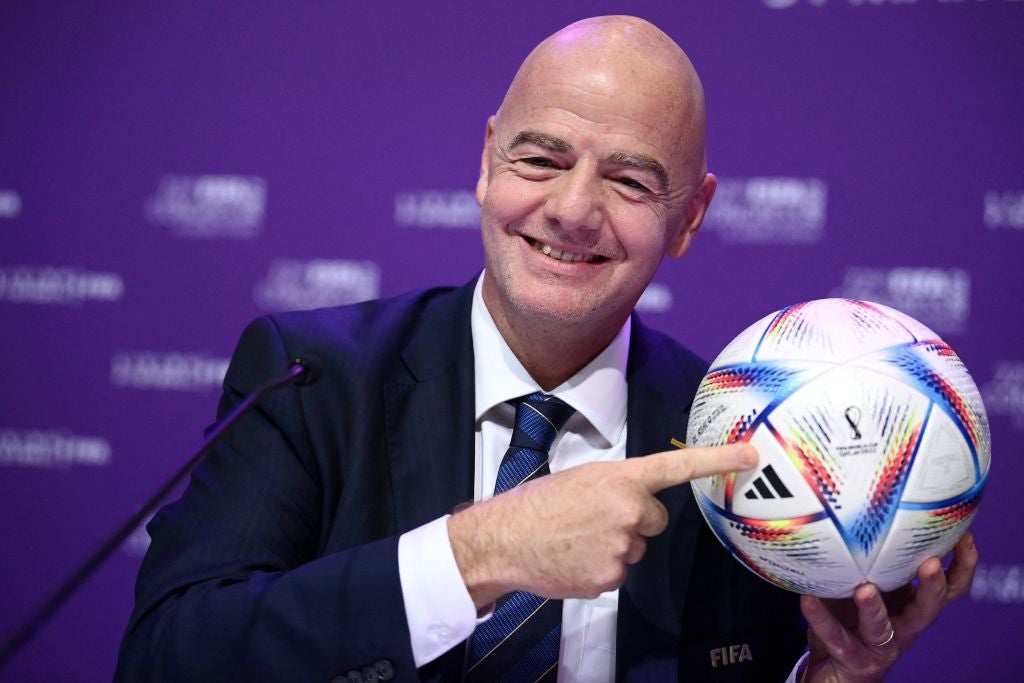
Everything laid out here indicates it may be the most problematic, even surpassing Argentina 1978, all the more so because a chance has been lost.
“This window of opportunity has now closed,” Archer says. “Most football associations, hotels and sponsors failed to engage with their human rights responsibilities in a meaningful and impactful way. Those involved must now look towards committing to push for remedy for victims of abuse and consider how they will seek to make processes like conducting human rights due diligence ahead of other international tournaments a norm for sporting associations.”
That is where Qatar 2022 can have effect for the future, even if there is no actual change. Saudi Arabia will after all bid for 2030, potentially bringing all the same discussions again, but once more multiplied by magnitudes of scale.
“This tournament could bring a greater level of forensic scrutiny,” Page says.
Ultimately, though, Worden sums it up.
“We can never again have a World Cup that fails to respect basic human rights.”







